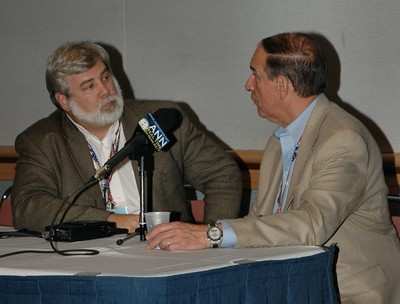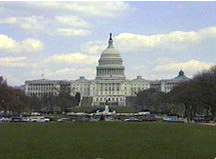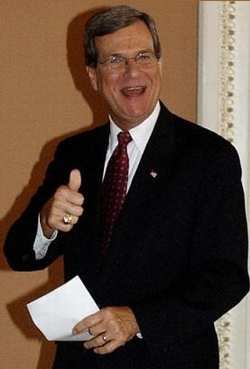We Like The Odds: AOPA Bats .900 In Backing Candidates
 For the folks who heard or read our fascinating discussion
with AOPA Prez Phil Boyer of a few day's back, you now
know what Phil was talking about when Boyer intimated that
Washington could look very different come January.
For the folks who heard or read our fascinating discussion
with AOPA Prez Phil Boyer of a few day's back, you now
know what Phil was talking about when Boyer intimated that
Washington could look very different come January.
For the first time since 1994, the Democrats will control the
House of Representatives. And for the first time in history, the
speaker of the House will be a woman — Nancy Pelosi, Democrat
of California. “This shift in power in the House changes the
picture for us on the user fee fight,” said Aircraft Owners
and Pilots Association (AOPA) President Phil Boyer, “but it
doesn't mean we've won the battle.
“However, now we can be assured of a fair hearing from
people who understand aviation and aren't beholden to the White
House.”

Aviation user fees are very much an idea pushed down from the
Bush administration. But the power shift in the House will most
likely put Rep. Jim Oberstar (D) of Minnesota in charge of the
House Transportation and Infrastructure Committee. Any law to
change the way the FAA is funded will have to originate in that
committee. As chairman, Oberstar would control what legislation
gets passed out to the full House to vote on.
Rep. Oberstar, a longtime friend to general aviation, has
historically opposed corporatizing or privatizing air traffic
control, and he is highly skeptical of any changes to the current,
proven FAA funding system.
 There will also be a
change in the leadership of the aviation subcommittee. The two most
likely contenders for that job are Representatives Peter DeFazio
(D) of Oregon and Jerry Costello (D) of Illinois. AOPA has a
longtime relationship with these key individuals. Both are
knowledgeable about general aviation, and both have demonstrated a
willingness to listen and understand the ramifications of user fees
on general aviation.
There will also be a
change in the leadership of the aviation subcommittee. The two most
likely contenders for that job are Representatives Peter DeFazio
(D) of Oregon and Jerry Costello (D) of Illinois. AOPA has a
longtime relationship with these key individuals. Both are
knowledgeable about general aviation, and both have demonstrated a
willingness to listen and understand the ramifications of user fees
on general aviation.
But on the other hand, the power shift also brings to the
forefront some lawmakers who have concerns about general aviation
security. “We'll have more work to do to educate people about
the great strides we've made in improving security, and to the
minimal threat that GA represents,” said Boyer.
To accomplish anything on Capitol Hill you have to have
relationships with lawmakers and their staffs so that you can talk
to them. It's not the kind of thing you can do with a phone call or
an occasional trip into the nation's capital. AOPA has a staff of
professionals dedicated to building these relationships. AOPA uses
its independently funded political action committee (PAC) and other
tools to keep the association in the forefront of lawmakers' minds.
AOPA gave its support to 143 candidates this election. The
criterion for AOPA's support was simply based on what the candidate
had done — or could do — for general aviation.
The association did well in picking the winners — more
than 90 percent of the AOPA-backed candidates were elected. When it
comes time to talk about user fees, those winners will remember
— and listen to AOPA’s arguments.
 While it's clear what
the balance of power will be in the House, as of this morning, the
Senate is still undecided. Control will be determined by the
outcome of two state Senate elections — Virginia and Montana.
The Democrats have to win both to take control.
While it's clear what
the balance of power will be in the House, as of this morning, the
Senate is still undecided. Control will be determined by the
outcome of two state Senate elections — Virginia and Montana.
The Democrats have to win both to take control.
Virginia is a dead heat, with Democrat James Webb slightly ahead
by the smallest of margins. In Montana, incumbent Conrad Burns is
in the fight of his life; he's trailed most of the night.
If Burns, a Republican, loses, general aviation will lose a good
friend who is chairman of the aviation subcommittee of the Senate
Commerce Committee. But if the Republicans retain control of the
Senate, the most likely replacement as aviation subcommittee
chairman would be Sen. Trent Lott of Mississippi. Lott (pictured
right) previously chaired the subcommittee, and he was given AOPA's
Hartranft Award for breaking the logjam on AIR-21, the legislation
that unlocked the aviation trust fund and made more money available
for airports.
“This election was a referendum, with American voters
making statements about corruption, terrorism, the economy, and the
war in Iraq,” said Boyer. “On these broader issues,
some of our members are likely unhappy with the results. “But
on the specific issue of aviation funding and user fees, we're well
positioned with the people newly in power who will, at the very
least, listen to us.”
 ANN's Daily Aero-Linx (05.06.25)
ANN's Daily Aero-Linx (05.06.25) ANN's Daily Aero-Term (05.06.25): Ultrahigh Frequency (UHF)
ANN's Daily Aero-Term (05.06.25): Ultrahigh Frequency (UHF) ANN FAQ: Q&A 101
ANN FAQ: Q&A 101 Classic Aero-TV: Virtual Reality Painting--PPG Leverages Technology for Training
Classic Aero-TV: Virtual Reality Painting--PPG Leverages Technology for Training Airborne 05.02.25: Joby Crewed Milestone, Diamond Club, Canadian Pilot Insurance
Airborne 05.02.25: Joby Crewed Milestone, Diamond Club, Canadian Pilot Insurance






